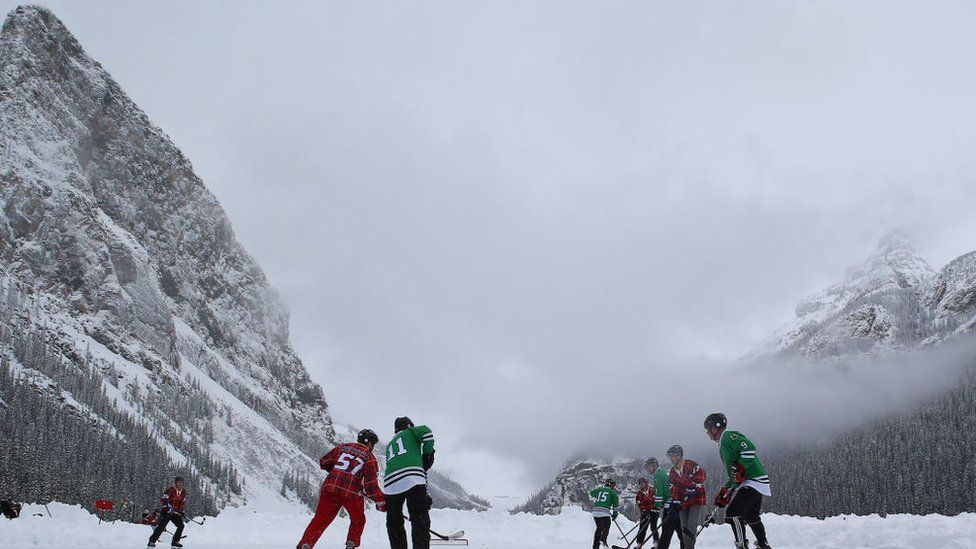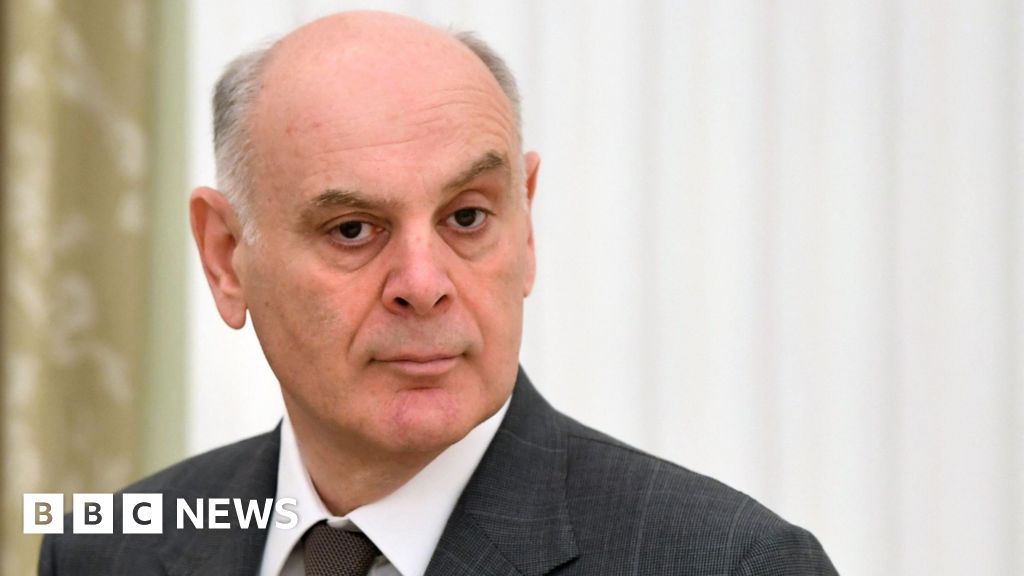ARTICLE AD BOX
By Nadine Yousif
BBC News, Toronto
 Image source, Getty Images
Image source, Getty Images
Many feel that hockey is part of their national identity
Canada, the birthplace of ice hockey, is confronting a sexual misconduct crisis within its largest and most prominent sport. The fallout has many asking: is ice hockey facing a widespread reckoning?
Hockey Canada, which manages programmes and teams in the country from entry-level all the way to world championships and the Olympic Games, has been rocked by public allegations of sexual assault against its players since earlier this year.
The sports body - largely seen as Canada's voice for ice hockey on the international stage - is now facing consequences not seen in its storied 108-year-old history.
In recent weeks, major sponsors have fled, parliament has launched a probe into the organisation and frozen federal funding and its senior leadership is under mounting pressure to resign.
Prime Minister Justin Trudeau has said the organisation needs a "real reckoning".
Hockey Canada has since vowed to "shatter the code of silence" and to "eliminate toxic behaviour in and around Canada's game".
The outcry and scrutiny stem from allegations of sexual assault against members of Canada's national junior hockey team, some dating back decades, that have surfaced in the last few months.
Experts say the issue has since ignited a national conversation about a culture of silence in the sport, and questions as to whether ice hockey's place as the centrepiece of Canadian culture has shielded it from criticism and accountability.
It all began last April, when a 24-year-old woman filed a lawsuit against Hockey Canada alleging that she was assaulted by eight players, including members of the World Junior team, in the town of London, Ontario.
The alleged assault took place in a hotel room in the summer of 2018, following a Hockey Canada Foundation fundraising event while she was intoxicated, and she later felt pressured not to report the incident to police, according to the lawsuit.
In May this year, sports network TSN revealed Hockey Canada had quietly reached a settlement with the woman.
Neither the woman nor the accused players have been named publicly, though a number of players from that year's team, now in the National Hockey League (NHL), have issued statements denying any involvement.
In June, troubled by how Hockey Canada handled the incident and amid concern federal funds it received may have been used to settle the lawsuit, a parliamentary committee launched a series of high-profile hearings into the organisation and its leadership.
That parliamentary probe has since raised more questions about how Hockey Canada, which recently reported an annual revenue of C$61m (£38.9m), dealt with the 2018 case and other past sexual misconduct allegations.
Amid the scrutiny, it was revealed that the organisation had used its National Equity Fund - made up of membership fees paid by young players across the country - to settle past sexual assault claims.
It was a revelation met with anger from Canada's hockey parents - and a practice Hockey Canada has since announced it has cancelled.
It has said it dealt with one to two sexual assault allegations per year over the last six years, and has paid out C$8.9m in 21 settlements since 1989.
In a July hearing, Hockey Canada's lawyers also testified that the organisation's vice-president of risk management contacted them first about the 2018 allegations before taking it to the local police.
The team's players were also not required to participate in the third-party investigation commissioned by Hockey Canada to look into the assault. That was closed in September 2020 "without prejudice to reopening it later", the lawyers said, because the alleged victim declined to participate at the time.
The woman has since come forward and said she did cooperate with the police investigation, disputing a prior statement by Hockey Canada that said otherwise.
"I think it's fair to say Canadians have lost confidence in Hockey Canada," said Peter Julian, a member of Parliament with the New Democratic Party, who sits on the committee looking into the organisation.
It is no secret that Canada has prided itself on the toughness of its hockey players.
Image source, Getty Images
Children of dedicated hockey parents step foot on the ice at a very young age. They spend hours on rinks and on buses to and from games and tournaments.
Those disciplined and talented enough to play at an elite level earn the title of hometown hero - a source of pride for the community that raised them.
Some say devotion to the sport in Canada is akin to that of a religion - one that dates back to the country's founding, when hockey served as a distinct marker for its national identity.
"It's this idea that hockey is played on the frozen ponds in the backyard, that we are a cold place where people can strap on skates and go out and play," said Kristi Allain, an associate professor of sociology at St Thomas University in New Brunswick.
Ms Allain said this "wholesome" vision of hockey is largely based on mythologised ideals of a sport that is rooted in violence and problematic ideals of rugged masculinity.
This romanticisation is why, Ms Allain said, it has been hard to achieve a meaningful reckoning within leagues and governing bodies, despite years of mounting scrutiny.
This is not the first high-profile case of sexual misconduct in Canadian hockey. In 1996, NHL player Sheldon Kennedy accused his junior league coach of sexually abusing him over the course of a decade.
That coach, Graham James, was sentenced to five years in prison for the abuse, but some have criticised sport officials for not doing enough to enact systemic change in the aftermath of that national scandal.
Another high-profile case involved Chicago Blackhawks left winger Kyle Beach, who went public last year with allegations he was sexually assaulted by the team's former video coach during the 2010 Stanley Cup playoffs.
An investigation later revealed the team was aware of Mr Beach's claims at the time but decided not to address them until after the Blackhawks' victorious championship run.
Image source, Getty Images
Image caption,Kyle Beach alleged that he was sexually assaulted by the Chicago Blackhawks former video coach
Other players have spoken out in recent years against a culture of racism in hockey, specifically towards black and indigenous players.
The tide now appears to be shifting, Ms Allain said. "This isn't the first time these stories have come up, but this is the first time we've seen sponsors walk away," she said.
It appears to be tied to a "unique cultural moment", where the general public is becoming more aware of the serious nature of sexual misconduct, said Katie Strang, a senior writer for The Athletic who has long covered hockey and allegations of abuse within it.
Other national sports bodies have faced their own reckonings worldwide, including USA Gymnastics - whose team doctor was convicted in 2017 of sexually abusing minors after members of the US national team came forward.
Football in the UK also had a sexual misconduct scandal in 2016 after allegations of abuse surfaced, which led to a landmark report that found the English Football Association culpable of "institutional failure" due to a lack of protection policies, especially for minors.
With the spotlight now on Hockey Canada, Ms Strang anticipated "an avalanche of survivors" will likely come forward with their own stories.
"The reason you are seeing this level of scrutiny, even up to the highest federal level, is the fact that Hockey Canada, which is a behemoth in Canadian sporting culture, settled this case," said Ms Strang, raising questions about the organisation's commitment to transparency on this issue.
She also anticipated a heightened pressure on sporting bodies as a whole to ensure players and the community surrounding them are kept safe from abuse.
Image source, Getty Images
Image caption,Though hockey is seen as a wholesome sport, some say it embodies problematic ideals of masculinity
Hockey Canada has promised sweeping changes, including mandating a lifetime ban on players who refuse to cooperate in investigations and implementing a system to report and track complaints of abuse and harassment.
Meanwhile, police in London have reopened their investigation into the alleged assault in 2018, and Hockey Canada's own third-party probe has been reopened.
The NHL has said it is also looking into the incident.
Further allegations have surfaced involving the 2003 World Juniors hockey team - a case the organisation is now investigating and which is being looked into by local police.
And parliamentary committee hearings are expected to continue later this year.
Chris Bittle, a Liberal MP on the committee, said the buck likely doesn't stop with ice hockey. Allegations of abuse have also been levelled against the body governing gymnastics in Canada.
"[The parliamentary probe] may need to be far broader than just Hockey Canada," he said.

 2 years ago
16
2 years ago
16







 English (US)
English (US)